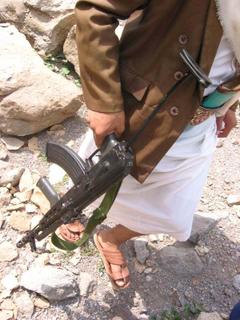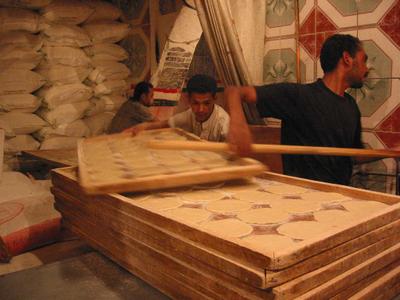I'm sure many of you are familiar to the scene I find myself in now ... an internet cafe abroad. This time in Sana'a, the capital of Yemen. There's a guy watching one of those rediculously cheesy Bollywood movies next to me, another one playing the blood-soked "Half-Life" game, someone is listening to Britney Spears unnecessarily loud, one guy is trying to get a girlfriend in a chatroom "are you handsome - hell yeah - you have a pic? - no scanner, husband won't let me have one - tell me you want me - I want you baby" - this is true!! I shouldn't stare at his screen so much, but I'm startled!! Next to all that, there's really annoying flying ants around, which get everywhere and interrupt one from typing every other minute. Aaargh, one just got under my
Futah (the Yemeni equivalent of a sarong). Somehow, they're not very good at holding on to the turquise wall, so every now and then, one suddenly drops to the ground - quite amusing, well, for a German, anyway. I'm at PC 8 and having some difficulty with the keyboard. Each key has between 3 and 5 different signs on it, Arabic and English.
Anyway, now that I finally got something together for this weblog and have big aims at keeping it up to date, I want to start from the beginning...
__________________________________________________________________________________________________________________________________________________________________________
31 degrees celsius at 6 o' clock in the morning. Welcome to Doha airport, Qatar. The sun has only just risen above a huge shed (hangar) at the end of the air field. As I walk down the stairs from the plane to the bus, still shocked by the heat, I try to imagine the temperature at lunchtime... Nobody seems to want to stay here - everybody queues for "transit".
Inside the ice-cold airport building , a group of young Koreans has occupied a corner of the busy gate-lounge area, where they sit singing. I grab a seat near them. A guy who is either very tired from the journey or mildly disabled is holding the songbook, while staring through the ceiling with half-closed eyes. A tall, lanky guy is playing the guitar and a group of girls opposite him are singing compassionately. I look away - over to the Arabs in their long, white, perfectly ironed Jalabas, standing next to the shiny, red Porsche - the star-attraction of the aiport's "shop & win" raffle competition. All of a sudden all the Koreans have their eyes closed, intently listening to a beautiful, moon-faced girl in yellow, saying a prayer. She smiles like the first rays of the morning sun as she finishes. A stealthy look of hers meets my eyes. Then, like an army of believers, all of them take out little books with thin pages - bibles? - and bow their heads to read. What do these young people believe? Are they ... religious? ( - has this term acquired negative connotations in recent years? - am I religious?) They seem so devoted, holding their leather-clad and zip-able books, discussing over them in little groups, nodding as they turn back to the pages.
I think one can spot Korean girls by their hair style. It's either very short & boyish, but still covering the top part of the forehead, OR long in the back, bound together in a bun and with a stereotypical pony-cut, falling across the forehead, until it reaches the temples, where it abruptly becomes much longer, framing their pale, flat and tenderly gesturing faces in the coal brown of their hair. Maybe they are Buddhists. I have only seen Buddhists smile and laugh so much when speaking about their religion.
An airport official with a walkie talkie enters the rectangle of seats, somewhat approaching me (the only European in the area), but keeping his question general: "anyone else flying to Bangkok?" -?- funnily enough the German border officer at Munich airport asked me, too, as I indifferently passed him my passport: "Bangkok?!" - in fact, it was almost a statement, delivered with confidence.
Do I look like one of the 20 male German pensioners that die of a Viagra-induced heart attack in Thailand every year? I have to think of the poor, pretty, fragile and young Thai girls that suddenly have a fat, old German dying and gasping for breath in their makeshift beds. What a repulsive thought.
Four Arabs with red versions of the famous Arafat-cloth covering their bearded heads are waiting for the plane to Sana'a with me, laughing to each other. They seem nice, amusing and friendly. We pass through the blazing heat into an airconditioned bus. Despite their positive first impression, I can't keep myself from being critical: they wouldn't speak & laugh like that with their women, would they? -- They carry little black man-purses, which look funny through European eyes, dangling from their tanned hands.
As we get out of the bus and walk up the stairs towards the international stewardess-smile, kindly waiting to welcome us on board, I pray that my backpack may be on this plane. Either way, I forgot to bring my Arabic dictionary, which is really clever, considering I'm going to do an Arabic language course. But hey.
Qatar Airways - their logo is an Oryx antilope in a circle - I wonder how many Oryxes still wander the deserts of Arabia. -- After take-off, the screens on the plane show the direction of and distance to Mecca. From just over Sana'a, it is 811 kilometers to the right rear part of the plane, i.e north-north-west.
In the queue (this has got to be the most awkward English word!) for the visa-counter, Florence, the French psychoanalyst I met on the plane, proudly shows me her filled-out visa application form (with an extra xerox copy) and the two passport-size photographs, which she insists we need in order to get a visa. Manuela (an Italian traveller) and I, not having either, look at each other with a mixture of surprise and "I'm sure it'll be fine". The visa official takes Florence's 60 US$ and her passport and begins issueing the visa. He makes a minimal dismissive gesture with his hand as she also offers her photos and the application form. Poor Florence.
She explained to me earlier, that Freudian psychoanalysts don't speak much. She was not a Freudian psychoanalysts. Lacon was her man - supposedly the single most important French psychoanalyst and he was the master of her school of thought. She also explained that most people, who become psychoanalysts later in their life (she was a city planner -
"une urbaniste" - before) have had a frustrating sex-life.
Having discovered my backpack in a corner of the arrivals hall after waiting next to the slow and dirty baggage belt for a while, I said bye to Florence, who had by now found the other French people from her group and Manuela, who was also happy, because somebody had come to pick her up with a big sign saying her name. As I walk past the blue-uniformed custom officials, with my look firmly directed ahead (although this time I wasn't even smuggling any alcohol into the country), I see the first Yemeni faces - eagerly awaiting the arrival of friends and loved ones. Stern and proud faces of bearded men, wearing brown suit jackets over their light coloured
Jalabas and around their tummy sits - just above the waist - the thick belt holding the famous and traditional
Djambia - a short, broad dagger in a flat, bent sheath. This is one of the peculiarities that makes the Yemen such a fascinating and traditional Arab country. If anyone believes Dubai will give them an impression of Arabia, they might aswell come to St.Andrews to get an impression of Scotland. The Yemen [or
al-Yaman, as it's called here (whoo-hoo!!)], at the very bottom of the Arabian peninsula, bordering only Oman and Saudi Arabia, is where the West has yet had the least influence and where life seems - at least from what I can say after my first day here - pretty much the way it always has been, except maybe that donkeys have now been replaced with Suzukis, camels with Range Rovers and horses with Mercedeces... back to the dagger, though. At least every second man you see on the streets, in the market, in cars and in tea houses has one right in front of his belly - it gives them such a manly readiness, such a mucho but also rough touch. Entering old Sana'a later in the evening, I feel quite like Indiana Jones. One can easily imagine everyone of these dagger-bearing men to be potentially dangerous and hostile. Their keen and lively eyes follow you, as you try to very unsuspiciously (with your bright blond hair) make your way through the narrow lanes lined with shops and stalls. Anything could happen. You almost begin to expect some little boy to jump out of a shop and run for his life with a stolen box firmly grasped under his little arms, followed by the infuriated shopkeeper, whose collegues immediately leave the shop to their assistants and jump to his help, drawing their daggers as they run to catch the thief, who, in the meanwhile, has brought havoc to the market, as he throws everything he can get hold of during his risky escape in the way of his pursuers. But he can't shake them off. A big barrel of dried chickpeas finally wins him the battle - he knocks it over as he flies past one of the spice stores. Moments later thousands of tiny peas cover the ground behind him and cause the angry and exasperated shopkeepers to slip and fall ... something is pulling on my shirt and brings me back to reality - a young lad offering me to try one of the fruits he's selling from a wheel-barrow. They're cactus fruit and taste delicious, refreshing and not too sweet, despite a large abundance of pips.
There's three other young people studying Arabic in the language institute here. Arnout, a really friendly Dutch guy - tall, blond and somewhat positively earnest in all his endeavours - Germans and Dutch are very similar I've decided - he's always properly dressed, with a stripy or checked shirt, trousers and Timberlands, whereas I have already started wearing a probably rather unattractive mix of Yemeni clothes and my own. Then there's Corinne, a pretty English girl, who has a bit of a Manchester accent. She often wears the whole black cover-thing, because she's also working for a Yemeni newspaper. She talks a lot and buys a lot, but seems nice otherwise. Finally there's John, an English guy also from St.Andrews, who has a very cute smile, especially with the little grooves which form in his cheeks when he laughs. He left today, unfortunately, having undergone a complete Yemenisation. He wore a far more traditional version of the
futah than me and sometimes even the
Djambia. His posture and maneurisms seem to have adapted entirely to the Yemeni surroundings. Maybe he always moves like that, but he seems completely at ease with the people (particularly the kids), the culture, customs and the language, greeting shopkeepers and having little polite or funny conversations with them, as if he's been speaking Arabic for years.
Together with the institute's two employees, Ghalib and 'Esaam (who deserve an extra chapter at some point) we four had a wonderful evening eating the best fish I've had in months (with our hands of course) and wandering the streets of ancient Sana'a.

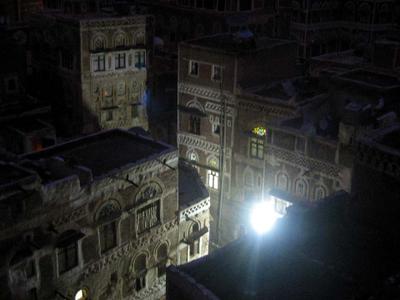
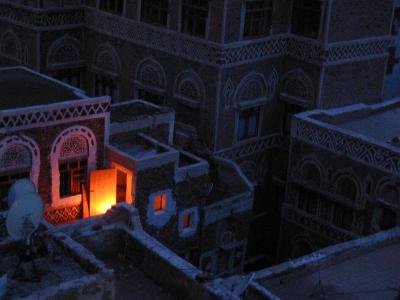
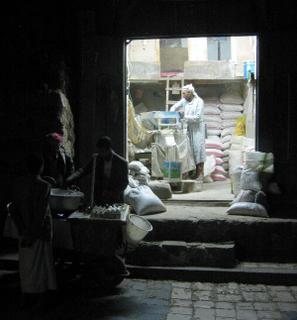
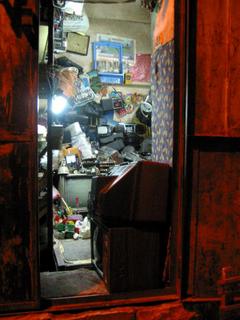






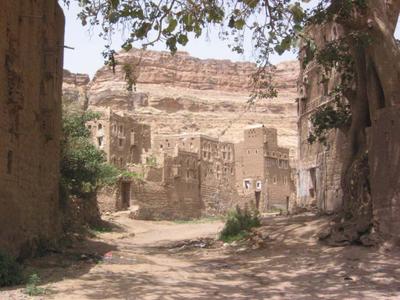
 This and the next picture show the house of the Imam, called "Daar al-Hejar", which means as much as 'house of the stone'. It's quite spectacular and attracts big crowds of tourists, luckily mostly Yemeni, though. I also saw a small Japanese group there and one of them was such a styler, could have walked straight off the set of "Lost in Translation" - in the Japanese rebel-schoolboy look: white shirt - buttened up, black tie, mushroom-hair, tight black jeans around his tiny waist and then big black paratrooper-boots, pushing the end of the jeans up over his shins, a cool leather laptop-bag over his skinny shoulders. With all that and his minimal black sunglasses he looked so completely removed from that place, so without any relation to it at all. And then there was me, trying so hard to fit in: turban, skirt-type thing and belt & dagger around my waist. It's funny actually, while I'm trying to look Yemeni, most of the young people I meet here (especially the wealthier ones in Sana'a, not so much in the country) are trying similarly hard to look European/Western - with tight, overly-coloured and -patterned jeans, funky shirts and gel-soaked and -styled hair. Anyway.
This and the next picture show the house of the Imam, called "Daar al-Hejar", which means as much as 'house of the stone'. It's quite spectacular and attracts big crowds of tourists, luckily mostly Yemeni, though. I also saw a small Japanese group there and one of them was such a styler, could have walked straight off the set of "Lost in Translation" - in the Japanese rebel-schoolboy look: white shirt - buttened up, black tie, mushroom-hair, tight black jeans around his tiny waist and then big black paratrooper-boots, pushing the end of the jeans up over his shins, a cool leather laptop-bag over his skinny shoulders. With all that and his minimal black sunglasses he looked so completely removed from that place, so without any relation to it at all. And then there was me, trying so hard to fit in: turban, skirt-type thing and belt & dagger around my waist. It's funny actually, while I'm trying to look Yemeni, most of the young people I meet here (especially the wealthier ones in Sana'a, not so much in the country) are trying similarly hard to look European/Western - with tight, overly-coloured and -patterned jeans, funky shirts and gel-soaked and -styled hair. Anyway.
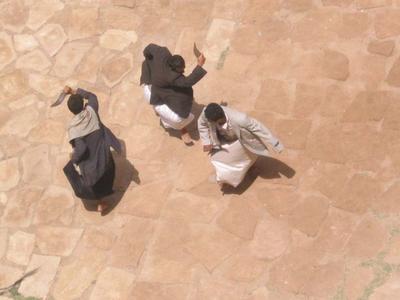 Traditionally, weddings in Sana'a happen on Thursday nights (the first day of the weekend here) and on Friday mornings the bridegroom and his male companions make a trip to Wadi Da' and perform the Janbia-dance under the "Daar al-Hejar". It is one of the few times in the life of a Yemeni man, that the dagger is actually drawn, other than to show it to friends. The dancing itself isn't really as spectacular as I'd hoped for -- quite slow, but it looks terribly funny to see a bunch of men waving big daggers around and running after each other in a circle, especially when viewed from above. The fact that every other Yemeni man (in villages probably more like 80%) is armed with at least a dagger, does have some consequences. I wouldn't say that it makes the place insecure for foreigners, quite the contrary, actually, but if a personal conflict or family feud between Yemenis DOES ever escalate, the obvious thing after the first few punches have been exchanged - is to draw the Janbia. So it is one of the more common causes of an unnatural death here.
The presence of fireweapons is a bit of a different issue. A recent law in Sana'a forbids people to carry guns in public except if they have a specific permission to do so, i.e. if they're either in the army, or work as guards for the many embassies, sheikh's homes and random rich people's residences. Still one sees them around and only yesterday a man got into one of the little Suzuki-buses with a classic AK-47 in his hand. His dress didn't distinguish him noticably from the other passengers and everybody seemed at ease with the presence of that weapon in the car. I'm not really alarmed anymore either, it has almost become normal.
Traditionally, weddings in Sana'a happen on Thursday nights (the first day of the weekend here) and on Friday mornings the bridegroom and his male companions make a trip to Wadi Da' and perform the Janbia-dance under the "Daar al-Hejar". It is one of the few times in the life of a Yemeni man, that the dagger is actually drawn, other than to show it to friends. The dancing itself isn't really as spectacular as I'd hoped for -- quite slow, but it looks terribly funny to see a bunch of men waving big daggers around and running after each other in a circle, especially when viewed from above. The fact that every other Yemeni man (in villages probably more like 80%) is armed with at least a dagger, does have some consequences. I wouldn't say that it makes the place insecure for foreigners, quite the contrary, actually, but if a personal conflict or family feud between Yemenis DOES ever escalate, the obvious thing after the first few punches have been exchanged - is to draw the Janbia. So it is one of the more common causes of an unnatural death here.
The presence of fireweapons is a bit of a different issue. A recent law in Sana'a forbids people to carry guns in public except if they have a specific permission to do so, i.e. if they're either in the army, or work as guards for the many embassies, sheikh's homes and random rich people's residences. Still one sees them around and only yesterday a man got into one of the little Suzuki-buses with a classic AK-47 in his hand. His dress didn't distinguish him noticably from the other passengers and everybody seemed at ease with the presence of that weapon in the car. I'm not really alarmed anymore either, it has almost become normal. 